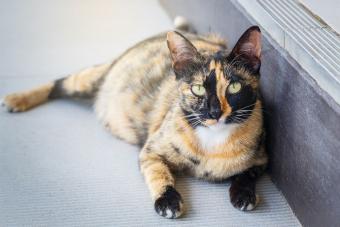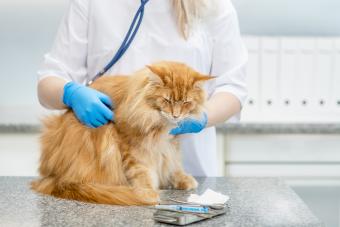
Coconut oil is known as a "superfood" with a variety of health benefits for people. But did you know can also use food-grade coconut oil to treat a variety of conditions and symptoms in cats? From retaining moisture in your kitty's skin to improving brain power in your older cat, there are some great uses for this safe, natural remedy.
Coconut Oil Locks in Cat Skin Moisture
Coconut oil is known to do wonders for locking in the moisture of a human's skin, but cats can also reap these benefits. A variety of factors can contribute to problems with a cat's skin or coat, and cats suffering from dry, flaky skin or dull fur may see quite a difference after using coconut oil.
A dull coat can indicate poor health in cats, so you may want to look into changing their diet in addition to supplementing with coconut oil.
How to Use
Coconut oil can be given orally or applied topically to assist with improving skin or coat condition.
- Use one-half teaspoon by putting it into your cat's food daily.
- Rub between your hands to soften and apply all over the skin.
- Use an Elizabethan collar to make sure your cat does not lick off the oil after being applied topically.
Coconut oil is safe and edible, so if your cat consumes some of it, it's perfectly fine.
Coconut Oil for Cat Gingivitis Treatment
Gingivitis, or the inflammation of the gums, is common in cats, especially if they don't regularly have their teeth brushed.
How to Use Coconut Oil for Gingivitis
You can use coconut oil for gingivitis by rubbing a pinch of coconut oil directly on the gums to help treat inflammation and pain caused by mild gingivitis.
Coconut Oil to Slow Kidney Disease and Cancer
PetMD states omega-3 fatty acids, which are prevalent in coconut oil, can assist in the slowing of progression of kidney dysfunction, and PetEducation states these acids may even slow cancer progression. The acids found in coconut oil provide energy and extra protein to a cat's body.
How to Supplement Coconut Oil in Your Cat's Diet
By allowing your cat to eat ½ to 1 teaspoon per day or mixing this amount into your cat's food, you may be able to slow the progression of kidney disease and cancer.
Relieve Cat Constipation With Coconut Oil

Coconut oil absorbs easily in the digestive tract. And coconut oil is a safe way to give your cat some relief from constipation as moisture and fatty acids help move along any stool that is backed up in the intestinal tract.
How to Use Coconut Oil for Your Cat's Constipation
Start by giving your cat one-half teaspoon per 10 lbs of weight once per day. You can allow your cat to lick it off a spoon or mix the oil into his food. If your cat does not have any side effects but is still suffering from constipation, try increasing the oil intake to the same amount taken twice per day.
Use Coconut Oil to Improve Brain Power in Geriatric Pets
As pets grow old, their minds tend to slow down, and they aren't able to react or learn as quickly as they did when they were younger. Coconut oil is rich in medium-chain triglycerides, which can improve brain energy metabolism and decrease brain lesions in senior pets.
How to Use Coconut Oil to Improve Your Cat's Brain Power
To improve your cat's brain function, HealthyPets recommends feeding your cat one-quarter teaspoon per 10 lbs of weight twice per day, given by itself or mixed with food.
Coconut Oil Is a Remedy for Hairballs
Hairballs are normal for cats after grooming themselves, but excessive hairballs don't have to be the norm. Coconut oil is a non-petroleum based lubricant, and Dr. Becker at HealthyPets says Omega-3 acids are an important factor for getting rid of hairballs.
How to Use Coconut Oil for Hairballs
Adding just a pinch of coconut oil to your cat's food every day can make their life (and yours) much more comfortable.
Coconut Oil Promotes Lean Body Mass
In a study with 50 overweight cats, researchers at the National Institutes of Health found cats fed daily coconut oil reported weight loss and leaner body mass than those without coconut oil. The oil appeared to have aided in metabolic function.
How to Use Coconut Oil to Add Lean Body Mass
To promote lean body mass in your cat, mix ½ teaspoon of coconut oil into his food once per day.
Is Coconut Oil Safe for Cats?
Coconut oil is extremely fatty and caloric, with 14 grams of fat, 12 to 13 grams of saturated fat and 117 calories in just one tablespoon. Due to its fatty nature, small and gradual use of coconut oil is recommended. If you use coconut oil regularly for your cat, you should be aware of the following potential issues:
- Excessive use can cause diarrhea, nausea, vomiting, or other digestive issues.
- In a clinical trial on essential fatty acids, cats given hydrogenated coconut oil suffered from fatty livers. If your cat has liver problems, it is best to avoid using coconut oil, and for any cat, use pure, virgin (non-hydrogenated) oil.
- Never force your cat to eat coconut oil. Forcing oil into a cat's mouth can cause the cat to aspirate it, which in turn can cause pneumonia.
- Always consult with your veterinarian before adding coconut oil to your cat's diet.
Check the label and research the company to avoid harmful additives or processed chemicals in the coconut oil you pick for your cat.
Coconut Oil Is a Healthy Alternative
Organic coconut oil for cats is a safe and effective ingredient to help deal with many feline health issues without the use of medication. Coconut oil is readily available and affordable, and introducing it into your cat's diet can improve his overall health and well-being.







